|
Where to even start. First it was COVID-19. That was enough on its own. Then George Floyd’s murder. Then helicopters all day and into the night, and Lake and Minnehaha being burned and looted. So many businesses closed or gone. Target. Cub. The Post Office. Third Precinct. The Bank. Ghandi Mahal and all of those businesses. Aldis. Minnehaha Liquors. The gas stations. Walgreens. Car X. The old Dennys and all. All down Lake Street. Protests. Looting. Arson. Gun shots. Smoke drifting into our yard, our house, stuck in my clothes, for several days. Broken windows. Sirens. No sirens.
Many wonderful initiatives. Food banks and the like. A lot of people helping where needed. How long will that last? How long until the struggling businesses and neighborhoods are back on their own again? If ever. And that is not even what this is all about. It is about the killing of George Floyd, the blatant racism in the police department, the city, the country, the world. Systemic racism, built into the way everything works. In each of us. In me. Too much to take in. Maybe J said it well this afternoon. Trauma. Numbness, enough to make it impossible to know what anyone, what I am feeling or thinking. And then there are so many words. So many admonitions, suggestions, “meaningful” quotes, “confessions,” comments and “answers,” articles, news releases, unknown media sources, questionable/inaccurate facts or lies, great leadership, total lack of national leadership, unmarked SUVS with no license plates in our n’hood, theories, gasoline or kerosene in water bottles rumored in various places, nightly n’hood patrols, instructions to fill your tub with water, leave your first floor lights on all night, have your yard hose ready, be ready to bang on pots if you see something, have a bag with things ready to go. I walk many, many steps each day, and then I can sleep. Once again there are too many words for me. I can’t take it in and I get stuck watching it. And I am tired of all the stuff people seem to know and need to share, need to pontificate about, sound smart about. Because I don’t. I don’t know. What comes back to me are all of the stories I have heard over the years. All of the people I know who have told them to me. What I’ve seen on the streets. What I have never experienced. The media and articles and essays are not what have caused change in me. It’s the people who have shared their lives with me. They have made it real. I have been fortunate. Their honesty with me has been an amazing, painful gift. I feel like I’m at least a few steps ahead of many of the people I know. Trinity and Cedar-Riverside have provided that for me. I like to think I have used some of that well, have become a bit more aware, have done a bit more of “the work.” But there is so much more to do. And it’s not the kind of thing anyone can tell others. Each person’s journey is its own way. We need to listen to black people though, not each other. Bob, Noah, and Micah have begun a conversation around all of this. I am part of it, but they are much more cerebral than I am. I will be a part of it, will listen and will offer what I can. As I drove up and parked here, next to the creek, a man in a house across the street kept an eye on me. I am assuming that because I am white (and small) he didn’t feel threatened. If I were black, would he have called the police? I know some of the fear the blacks have experienced. There has rarely been a time when I have not wondered if I, as a small woman, was safe when walking alone. I don’t walk alone at night and there are places I won’t walk. When I see someone coming, I wonder if they intend harm, unless they’re older and smaller than me. There is a difference, I think, but what? I do experience a lot of privilege for sure. I’ve heard myself say a number of times, “What? Sorry, I didn’t hear you, I have this mask on.” Just a sign of how everything has made it hard, if not impossible, to be present. In the present. To think and feel and to speak. And to listen and hear. Which is sad. Listening is one of the first steps in the work that needs to be done. Original journal entry date: 6/4/20 ©Jane Buckley-Farlee, 2020. All rights reserved.
8 Comments
 From Church Bells to Adhan – 2 This is the seventh day since the first Adhan in Cedar-Riverside. The posts on Facebook of that historic evening have slowed, but they are still being shared and commented on. Muslims, especially from Somalia and East Africa around the world have seen videos of the evening. There is an image from that evening that I can’t get out of my head. It is the gentleman who was standing in the same area of the parking lot I was standing in. He was there when I arrived and stayed in the exact same place the whole time. He didn’t move. I may have known him, but his mask left me uncertain. It was cold that evening. He was wearing the long robe men wear for special occasions with a warm jacket over it. He had on the cap that is common among men. I think he had henna on his beard, but maybe I just assumed it. He was facing the mosque, towards the men’s and women’s doors, and the general direction of where the speakers were placed on the roof. Almost towards Mecca, but not quite. And he didn’t move. At one point I said hello and commented that this was a wonderful day and he replied yes, it is. Somehow though, I knew that would be the extent of our conversation that evening. Not because he may have had limited English and not because he was rude or shy. It is quite possible he hadn’t heard Adhan outside, for decades, since whenever it was that he left Somalia. If he had heard it during a visit in Somalia or one of the two times it was broadcast in Cedar-Riverside for small gatherings over the past two years, this would be the first time he would be able to hear Adhan five times a day for the holy month of Ramadan in his home, in the neighborhood where he lives. I wish I could have heard his story. I would have loved to ask what this evening was like for him. He was so focused, almost in another time and space, it seemed to me. It was not my place to interrupt that. So, we stood there, more than six feet apart, masked and gloved, and listened. I can’t presume to know what he was thinking or feeling in that parking lot that evening. I assume he understood the words that were chanted and spoken. I could not. Either way, it was a powerful moment. Certainly, for him. For me, too. And for all those gathered. Sometimes there are moments that are bigger than words. This was one of them. ©Jane Buckley-Farlee, 2020. All rights reserved  One of my favorite childhood memories is the time each summer I stayed with my Grandma in Reedsburg, a small town in Wisconsin. Every day, 4 times a day, one of the churches’ bells would ring out the time. Back then the town was small enough that you could hear the bell throughout the whole town. I’m pretty sure the bell that rang was from my Grandma’s church, where my family would attend when we were in town. In fact, I would go with my Grandma when she was on the Altar Guild and as they prepared the church for Sunday I would hang out in the Chancel. I sometimes wonder what part that played in my calling to become a pastor. To this day, when I hear a church bell announcing the time of the day, I get a warm, fuzzy feeling. I’m sure it is, in part, left over from those idyllic days when I was young. Yesterday was the beginning of Ramadan, the Muslim holy month similar to Lent. It is a time of prayer, good deeds, fasting, and spiritual reflection. It is a time for Muslims around the world to be more intentional than usual in living out their faith through loving others and showing mercy and kindness to others. During Ramadan Muslims fast from sunrise to sunset. This can be particularly challenging in the Northern Hemisphere during the summer months where fasting can last 18 hours. But even without that added challenge, Muslims find community and encouragement in knowing that others are fasting and praying at the same time. And, of course, the breaking of the fast each evening with an Iftar with family and friends is an especially joyful time for everyone. This year with COVID-19 and social distancing, the mosques are closed and people are left with praying alone at home and eating at the end of the day without their family and friends. A time that should filled with joy will be much lonelier this year. But in Minneapolis, Mayor Jacob Frey saw the wisdom of allowing Adhan to be broadcast out loud in Cedar-Riverside during Ramadan. Cedar-Riverside is home to the largest concentration of Somalis outside of Somalia. When he was asked by CAIR-MN and Dar Al-Hijrah to waive a city noise ordinance for this holy month, he agreed. For the first time in Minnesota history Adhan will be heard throughout Cedar-Riverside 5 times a day, this year April 24 through May 24. Yesterday evening was the first Adhan of 2020. Imam Sharif had invited me to come. I had mixed feelings about going given social distancing and all. I also didn’t want to miss this for almost anything. It was an honor to be there. People were milling around, visiting and waiting. Face masks were being handed out. People were reminding each other to stay apart. Different media outlets were interviewing and commenting on this historic moment. People in Somalia were seeing this moment live. When the time for prayer came the speakers on the roof of Dar Al-Hijrah sent out Adhan. Silence immediately settled on all who had gathered. Cell phones were held up and recording. And we listened. I don’t know long it lasted, but the silence held. Imam Sharif said a few words and a short call and response kind of litany came from the people twice. And then everyone left, heading for home for prayers and a meal. I felt those warm fuzzies again. I could only imagine what it was like for the people gathered. For some, this was the first time in decades they were able to hear Adhan outside since they left their home in Somalia. It is hoped that hearing Adhan will relieve some of the loneliness that will be even more profound during this month of gatherings and Iftars. It is hoped it will make the social distancing easier to maintain. One thing I know – I’ll be going back to the neighborhood from my makeshift office at home to hear Adhan more than once in the days to come. Not for the warm fuzzies. Warm fuzzies are nice, but too temporary. I’ll be going to hear, along with my Muslim brothers and sisters, a reminder of God’s greatness and bigness. A reminder that we are all created by God, that we are all in this, all of this life together. Original Journal entry date: 4/24/20 ©Jane Buckley-Farlee, 2020. All rights reserved. 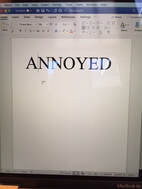 I have been annoyed lately. But, not by what you might expect. Sure, I didn’t like it when the woman who should have known better came and stood right next to me as I watched a muskrat at Lake of the Isles. And I miss friends and connecting with colleagues. And I miss Sunday worship. And I wish my two sons were closer. And everything is harder now. And , its exhausting. And, and, and….. I have been annoyed by something else and I have hesitated to say it. It won’t sound very nice, certainly not Minnesota Nice. Please don’t think I am judging or not appreciative. But this is what has been annoying me. I have been annoyed by all of the well-wishes. All of the sharing of thoughts and prayers. All of the Bible quotes whether they are meant to be condemning or comforting. All of the scurrying about to get everything done right. I have been annoyed by the wondering about what we will all learn from this. And by the comment that everything will be different when this of over. And I’m annoyed by hearing and saying we’re managing, so far, and adjusting. And I have done them all (except the Bible verses). Like I said, I hesitate to bring this up. I have, in fact, been comforted, inspired, and educated by some of these things. But it is still not a nice kind of thing to admit. I couldn’t get past feeling bad about being annoyed until I read the Gospel reading for this past Sunday, March 29, the story of Jesus raising Lazarus from the dead (John 11:1-45). What struck me in that story was that Jesus, after hearing that Lazarus was sick, waited two whole days before leaving for Bethany. He got there four days after Lazarus had died, long enough for Lazarus to stink. What was that about? I don’t know. But apparently it was OK with Jesus for all those he knew, all of those he loved, to have to wait. It was OK with Jesus for everyone to have to sit with, to be in the discomfort, the fear, the grief, the worry. Jesus felt no urgency to do something. To fix everything. To make people less uncomfortable. Maybe it’s OK for us to sit with, to be in the discomfort, the fear, the grief, the worry. Not forever. Not ignoring immediate crises. But, maybe it’s OK to be uncomfortable with everything for a while. Maybe it has to be. We’re at the very beginning of this. I know I can’t wonder what we’ll all learn from this when I’m not even sure what this is yet. One thing I can do is to try to sit with and be in and acknowledge the discomfort, the fear, the grief, the worry. If Jesus thought that was OK for everyone then, maybe it is OK for me, too. Maybe it’s OK for all of us. It’s even OK to be annoyed. Original Journal Entry date: 4.1.20 © 2020 Jane Buckley-Farlee. All rights reserved.  This is another entry in, “Things they never taught you in seminary.” What was to have been a nice, quiet walk through Cedar-Riverside, wasn’t. I headed out the back door, began down 20th Ave. and turned right on 6th. This is a route I often take. As I made my way down 6th I could see a group of kids hanging out on the corner. My first thought was that school was out and they were just hanging out. It looked like there were 8 or 10 kids just sort of mulling around, I thought. Being a die-hard introvert, it did occur to me that I could turn around and change my route. I do like walking alone. But that is not the only point of these walks. I also walk to ‘be’ in the neighborhood. To see what’s going on, what the mood on the streets is. So, I continued on my planned route. As I got closer, though, I could tell something else was going on. Another 25 yards or so closer, I could tell there was some kind of tension in the group. By the time I got to the group I could see that it was a fight. By this time, it was too late to turn around. Whether or not I wanted to be, I was now committed to approaching the group. My hope was that when they saw me coming, they would stop fighting. They didn’t and I found myself having to do something about this fight now right in front of me. It’s amazing how many calculations you can make at a time like this. It seemed like in less than a second I had determined that they were taller than me, but skinny. That they were girls, probably in middle school. That being girls it was maybe less likely that there would be a weapon involved. That no one else was going to anything about this fight. Before I knew it, I was yelling, “stop the fighting!” “Stop the fighting,” as if thought that would do it. Of course, it didn’t stop the fighting, but it did cause everyone from the group to scatter except for the 2 girls still fighting, now on the ground. An incomplete calculation: I have never been in a fight or had the opportunity to break one up before, but it did seem to me like they were not fighting very effectively. Just swinging without much thought. Is that good or bad, I didn’t know. Still yelling, “Stop the fighting” I saw out of the corner of my eye a young man, big, strong-looking, who quickly disappeared. Where did he go at such a time as this? My next calculation: the only way this is going to end is to get down in there and pull them apart. There I was, trying to find an arm or leg to use somehow to break it up. The first leg I grabbed didn’t work. Getting down in there a little bit more I somehow pried them apart. Still yelling. “Stop the fighting.” The next thing I knew the one girl, who had been on top, was running away and the girl on the ground was quiet, her face covered with her jacket, panting. “Are you OK?” “Are you OK?” No answer. I retrieved her backpack in case some of the kids returned, although they were clearly long gone. A woman I did not recognize further down 6th St. saw the two of us, the girl on the ground and me there, screamed, shouted a few 4-letter words and went the other way, at which time the girl on the ground started crying. “Are you OK?” Nothing. Until she got up and walked away. “Are you OK?” I followed a bit and she just kept walking away. I was the only one left on the street. That was when it occurred to me that this could have really gone wrong somehow. I continued on my walk, heart pounding, wondering what I had just done. With trembling fingers, I texted Carla, a friend and Safety Specialist in Cedar-Riverside. I wondered if I should report this? But I didn’t even see who any of the kids were. Would it be good to debrief? Soon, sitting in her office I told her the story. She listened patiently with a knowing smile and said, “You were the adult there.” Is that what it means to be a Christian presence in Cedar-Riverside, or anywhere? To act like an adult? Apparently, sometimes, it does. I didn’t recognize any of the people that afternoon, which is unusual. I usually recognize someone. But I have wondered: Was there a history of some kind between these kids? Will something else happen in the days to come? Did any of them know who I was? What was it like for these kids, especially the 2 girls on the ground fighting, to have a little white lady they didn’t know break up their fight? I’ll never know. But it felt good to have done some adulting that day. Original Journal Entry date: 2/5/20 © Jane Buckley-Farlee 2020. All rights reserved. 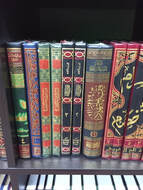 Sitting here, surrounded by books in Arabic about Islam, I see a shape on the cover of one of the books. What does my mind jump to? My eyes immediately see a fish symbol, the Christian fish symbol. Only after looking a bit longer, I see that, of course, it is not a fish, but a design that may or may not have meaning in Islam. How quickly and easily I see things through a Christian lens. Seeing things through a Christian lens is not a bad thing. It is my lens and it is a good lens. But when I am not aware of having only that lens, it makes things smaller. It makes the world smaller. It certainly makes God smaller. That is my loss. That is our loss. Original Journal Entry date: 11/13/19 © Jane Buckley-Farlee. All rights reserved.  I haven’t posted on my blog for a while. At some point I ran out of energy. Stopping wasn’t really a decision – it just kind of happened. A couple of people mentioned that they hadn’t seen anything for a while and asked if I had stopped. A couple of others have said that given the political and social atmosphere these days the stories I have to tell need to be told. That may or may not be true. What I think is not important. Some of the issues are. What has been on my mind most recently has been directly related to the context I am grateful to be in – Trinity Lutheran Congregation in the Minneapolis neighborhood Cedar-Riverside, aka Little Mogadishu. I have been pondering my privilege particularly in the midst of racism and Islamophobia. I just finished a book, So You Want to Talk About Race, by Ijeoma Oulo. I encourage others to read it. This book has touched me and I can’t get it out of my head. And I have seen Facebook posts that I have not been able to ignore. I have posted responses and those who know me well would know that is just not like me. But I can’t not. One post was racist and I commented. None of the responders to my comment agreed. Some of them questioned either my intelligence or sanity. Some of them were sure I was racist. In that racism is systemic I agreed that I was by virtue of my white skin. That’s where the writer stated that I sickened her. To me those seemed like some pretty strong words about someone she had never met. It also made me think I had struck a nerve. Given the atmosphere of the times, though, those words could have been much more offensive. Another post was anti-Muslim. The person who posted it on Facebook claimed to have been looking for more information that would prove that the topic of an article was not true. The Title of the article alone, however, was meant to further misinformation, fear and hate. Judging by the initial comments, it did just that. That is all it takes and then it gets shared. The article was about a radical group claiming to follow Islam. Once again the words ‘disgusting’ and ‘horrible’ were used regarding Muslims. I am quite sure that those who wrote those words know little or nothing about Islam and have never talked with any Muslims. The Muslims I know would never condone anything that the article was talking about and would be equally disgusted by it. One thing that I noticed was how strongly this post hit me. It was almost as if it knocked the breath out of me. Not because of the content. That article had made the rounds some time ago; I had read it then. I told Bob that this hateful article about a radical group was suggesting that all Muslims would engage in what this article was about. That meant those reading the article would knowingly or unknowingly be including my friends and colleagues – Fardosa, Wali, Sharif, Nadifa, Abdisalam, Ayan, Fayo, to name just a few. My privilege here is that I don’t have to live with the hate and fear every day. I don’t have people telling me to go back to where I came from as I walk or at the store. I have never been yelled at for wearing a ring with a cross on it. There aren’t people who hate me simply because I’m white or Christian. So, if I want to, I can ignore all of it. Too often I do. But my friends can’t. They have to live with it, day in and day out. Waiting for a bus. Shopping. In public speeches. I cannot fathom this reality at the moment. I don’t know where this pondering will all go for me. Perhaps nowhere. But it has been on my mind and heart and whether it is obvious or not, something in me has been changed, again. Original Journal Entry: 8/26/19 Copyright Jane Buckley-Farlee 2019 All rights reserved. 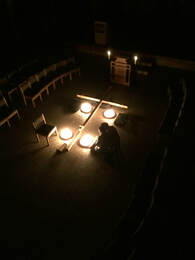 Good Friday. The faithful had gathered, about 45 people, seated in a circle surrounding the space saved for the cross. We had all come for a time of reflection, a time for contemplating the mystery of the cross, the mystery that somehow through his death Jesus conquered death, that through his weakness his strength was revealed. We had come knowing silence would be a part of our experience together. We were ready. The silence began. Everyone was settling in. The quiet came. A few minutes into the silence Alem stood up and said that the Spirit had spoken to him and he wanted to say a few words. He spoke about the day, the sadness of the church and each of us at remembering Jesus’ death, our grieving, our responsibility for his death and the hope we have in the resurrection. All of what he said was fine. And then he sat down. And the silence began in earnest. Five minutes. Ten minutes. We had now been gathered for 15 minutes and people were getting restless. But they were ready to endure. A few late-comers arrived and joined in the silence, looking a bit confused, but willing to take part in this mysterious event. There was sighing. Legs were crossed and uncrossed. One person left, presumably for the restroom, and returned. There were a few noises coming from the Atrium, but nothing we couldn’t ignore reasonably well. I began looking at Alem, hoping to catch his eye to somehow indicate that the silence had been long enough. That the service should move on. But our eyes never met. In my worship training I had learned that the one presiding had control of the service. The presider is the one to make sure that things run smoothly. I try to follow that practice, but have grown into a flexibility because of the circumstances in which I find myself, namely working with someone not trained the way I was trained, someone whose first, second, and third languages are not English. I also find myself constantly discerning the role of presider versus Senior Pastor, mentor, teacher, guide. However, ultimately things are my responsibility. I also am aware of Alem’s wonderful sense of the Spirit guiding the proceedings at hand and his deep commitment to following what the Spirit is telling him at any particular time, especially in worship. So, I assumed the Spirit was moving him to allow our silence to continue. I was also beginning to worry. Didn’t Alem realize he was the presider? Our pattern always is that the one who is not preaching is the presider. I had mentioned it to him, more than once about this particular service, even. I was worrying about the people so willing to take part in the worship experience that had been prepared for them. This is not what they had expected. Alem moved and there was sense of hope in the circle. Maybe now we will begin. Nothing. I wondered what the three Augsburg male students were thinking and I saw the Augsburg women whisper and smile at each other. Surely this isn’t what they expected, and they were so faithful to come to worship on a Spring Friday evening. The debate began in my head. Do I walk over to Alem and say something? Do I undermine his role as presider and Spirit-led man of God and begin the liturgy myself? Do I let this go on until he figures it out? How long can we endure? And, if I am the one to begin everyone will think this was my plan and my fault. I didn’t know if I wanted to laugh or cry. Twenty minutes. Twenty-five. Thirty minutes. Finally I decided “the heck with the Spirit, it is time to begin,” and so I led the Prayer of the Day. A great relief and willingness to pray - out loud - was evident. The adventure was not over, however. A few verses into the Passion Reading a loud chorus of “Mack, the Knife” from Three Penny Opera, complete with piano, began in the Atrium. Two worshipers ran out and quickly quieted the music. The service went on from there. Things went as planned although the remaining moments of silence were noticeably shorter than they would otherwise have been. We ended standing around the cross, which had been carried in, knelt in prayer before and surrounded with candles, with a triumphant singing of “There In God’s Garden.” A brief silence followed. The worshipers shuffled out. In silence. And were gone. I slept fitfully Friday night. I was angry at Alem and kicking myself for not having jumped in sooner. I spent the weekend preparing myself for the barrage of complaints that were inevitable on Sunday morning – and never came. In the midst of all that I was also grateful for the graciousness and openness of the worshipers that evening. Any other group on any other night and it could have been a complete disaster. In the midst of my angst I also could see the great humor of it all and have had several good laughs telling the story. We had suffered, each in our own ways, and we went our ways ready for the resurrection celebration to come. Alem and I will talk today, the first chance we will have had. Later. Alem and I have talked. And have had a good laugh together. He was expecting me to lead the service and was waiting for me to begin with the prayer. He had been trying to catch my attention to indicate that it had been long enough, but our eyes never met. On the instructional side of things, he really appreciated the long silence; it was the first silence at Trinity that was long enough for him to really get into it. He also said that our Eritrean family was very happy. The long silence is a part of their spiritual history and practice. So, this was a learning experience which I will continue to reflect on in some shape or form for and with Trinity. And I expect there will be other insights that come with time. For now Alem and I have come up with a code for getting each other’s attention if we are uncertain about something during worship. Original Journal Entry date: 4/13/04 ©Jane Buckley-Farlee All rights reserved 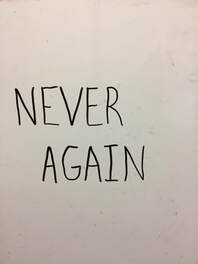 After our first Coffee and Tea, back at Trinity, Homework Help kids were starting to come. This time a Homework Help mom stopped in. I asked her how she’s doing, especially with all of this immigrant and refugee stuff happening after President Trump’s first Muslim travel ban. We talked a bit. She talked about a woman where she works who has come up to her more than once and told her to go home, that she hates Somalis and they don’t belong here. (This mom is not Somali, but rather Oromo.) Some of the other employees have told our Homework Help mom that this woman is not right in the head. But it is still hard to hear. And she never knows quite what to do. We talked some more and I told her that what that woman says is wrong and that I’m sorry she has to hear it. But then came the question that tore at my heart. Our mom wanted to know if ‘they’ were going to round them (Muslims) up and burn them. I was stunned. I can’t imagine what it would be like to live with that seeming like a real possibility. I told her that it couldn’t happen here. That too many people would fight against something like that. The thing is – I wasn’t really sure that if it came right down to it that I could do that if it happened here. As she left my office I could only hope and pray that I would never have to find out. Original Journal entry date: 2/6/17 ©Jane Buckley-Farlee All rights reserved. 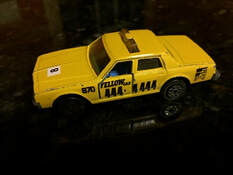 On Thursday one of our Homework Help students came into my office. She does that often, just checks in before getting to her homework. She is Oromo, a 9th grader at a Minneapolis Catholic school, Muslim and wears a hijab. This school seems to be a good school for her. She has struggled her first semester. Apparently, her grade school didn’t really prepare her for high school. But she has settled in and is doing fine. Joe had told me at the Wednesday Night Supper that she had had a bad experience downtown. And so I asked her. She had been downtown at her work site. Every student at this high school has a job placement as part of their school week. While she was waiting for her taxi to come to Homework Help a 40-ish white woman, bigger than her, walked up to her and told her to go home, to where she came from. Others were standing there and no one said or did anything. This woman went on to say that her brother married a Somali woman and that she, this particular woman, hates her brother’s kids. Our student knew that if she said or did anything it would escalate, not to mention the fact that she no longer felt safe as she waited. She said she couldn’t believe it. She was born in the U.S. This has been her only home. She is an excellent student. She felt totally alone and not safe. But she had to wait for her taxi. I told her that what that woman said was wrong and she shouldn’t have to hear things like that. And I said that I hoped she knew she was safe at Trinity. She went on to say that Homework Help is her second home. She knows she is safe at Trinity. I really didn’t know what else to say. I would like to have said that I wish I would have been there so that I could have said something. But I didn’t say that. I wasn’t ready to make a promise I might not be able to keep. Original journal entry date: 2/6/17 ©Jane Buckley-Farlee All rights reserved. |
AuthorAt less than 4'11'' a pastor and the congregation she serves practice radical hospitality in a primarily Muslim neighborhood. Archives
June 2020
Categories |
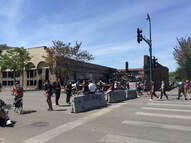
 RSS Feed
RSS Feed